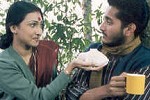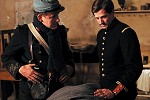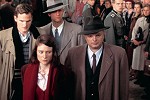 SHADOWS ARTHOUSE FILMS ’05
SHADOWS ARTHOUSE FILMS ’05SOPHIE SCHOLL | TIME TO LEAVE
< < M O R E | M O R E > >
last update 19.Oct.05
See also: SHADOWS FILM FESTIVAL | SHORT FILMS
 R E V I E W B Y R I C H C L I N E
R E V I E W B Y R I C H C L I N E Nishijapon
Nishijapon
 There are some intriguing themes swirling around this Bengali family drama. Despite the rather clunky filmmaking, it does make us think.
There are some intriguing themes swirling around this Bengali family drama. Despite the rather clunky filmmaking, it does make us think.
Retired widower Bimal (Soumitra Chatterjee) lives in an isolated mountain home, where he's visited by his good friend Brojen (De)--two old men swapping stories. In addition, Bimal's sons Nirmal (Chakraborty) and Shyamal (Parambrata Chatterjee) are home for the holidays. And Nirmal's wife Anita (Sengupta) has brought along her sister Suni (Sen), who she hopes will hook up with Shyamal. Amid the lively family debates, a heavy rainstorm sets in, followed by an earthquake that cuts them off from the outside world.
The focal point here is the way the family members are forced to redefine relationships during a desperate struggle for survival. Every tiny issue rears its ugly head--things that had been suppressed or accepted for years. The main topic is religion, trying to find meaning in the events as well as a balance between old world beliefs and modern cynicism. The dialog astutely examines these things without being simplistic about it. These people find themselves locked in a battle of wills that might actually be a life-or-death struggle. And their relationships will never be the same.
The cast bring small touches to the characters that make them intriguing. Shyamal and Suni are the most intriguing, so Chatterjee and Sen have the most to work with--young people trying to make sense of the world around them without the hang-ups of the older generation's blind adherence to religious tradition nor their older siblings' bondage to progressive society. Everyone else seems completely stuck in their ways by comparison.
Writer-director Ray (son of the great Satyajit, so no pressure there!) maintains a nicely observational tone that warmly expresses the characters and situations, centring on the dry wit, snappy interaction and familial teasing until things get much more serious. And even in the midst of calamity, there are moments of humour, tenderness, bravery and selflessness that feel earthy and real, never forced or sentimentalised. As secrets start coming into the open, and the plot struggles to resolve itself, the film gets somewhat wordy and obvious, but it still gets under our skin.
with Sabyasachi Chakraborty, Parambrata Chatterjee, Raima Sen, Rituparna Sengupta, Soumitra Chatterjee, Dipankar De

release India 15.Apr.05, UK 27.Oct.05 lff
05/India 1h43

17.Oct.05 lff
 R E V I E W B Y R I C H C L I N E
R E V I E W B Y R I C H C L I N E Joyeux Noël
Joyeux Noël
 This is such a great true story that it's a pity the film's so heavy-handed and deliberately weepy. But writer-director Carion over-stresses every emotional point, fills the dialog with mini-sermons and hypes the modern-day parallels.
This is such a great true story that it's a pity the film's so heavy-handed and deliberately weepy. But writer-director Carion over-stresses every emotional point, fills the dialog with mini-sermons and hypes the modern-day parallels.
It's December 1914, and the French and Scots are fighting in the trenches against the Germans. In a moment of tranquillity on Christmas Eve, the sound of bagpipes and then the voices of a German opera-singing soldier (Furmann), followed by his diva girlfriend (Kruger), waft across the battlefield. Soon the three leaders (Canet, Ferns and Bruhl) are meeting in the middle, declaring a cease-fire for Christmas. And a priest (Lewis) says mass for the mixed crowd. Will they ever be able to shoot at each other again?
Carion expertly recreates the settings and the superb cast beautifully brings the characters to life, bringing out the moving back-stories and adding the subtlety lacking in the script. But Carion is clearly trying to tell a Much Bigger Story, so every character is standing in for thousands of souls, and their willingness to lay down arms is a harbinger of an idyllic new world order that was never meant to be.
Maybe this is true, but the film would be much stronger if Carion allowed us to find the message ourselves. From the very beginning, he's wringing every drop of sentimentality out of each scene, contriving the various plot strands so he can drop thematic bombs on us. Some of these hit their target; there are real moments of honesty and provocative insight. But most of it leaves us cold, simply because it's so cloyingly obvious.
And despite the remarkable events, Carion doesn't seem to know how to tell the story. The structure is clunky and pushy, the dialog is pretty basic, attempts at humour are strained and repetitive, the opera-and-sex interlude is sweet but spurious, and of course one German officer is Jewish (irony alert!). In this sense, the film feels like the similarly award-grubbing The Chorus. At least the characters are engaging, and underneath the slush the film highlights a genuinely moving moment in history.
with Diane Kruger, Benno Fürmann, Gary Lewis, Guillaume Canet, Daniel Brühl, Alex Ferns, Dany Boon, Steven Robertson, Lucas Belvaux, Frank Witter, Christopher Fulford, Ian Richardson
 release Fr 9.Nov.05,
release Fr 9.Nov.05,UK 14.Dec.05,
US 3.Mar.06
05/France Sony 1h56

11.Oct.05
 R E V I E W B Y R I C H C L I N E
R E V I E W B Y R I C H C L I N E Die Letzten Tage
Die Letzten Tage
 MUST-SEE
MUST-SEE
 This heroic story from Nazi-era Germany traces one young woman's involvement with the White Rose resistance movement, her arrest, interrogation and trial. And the filmmakers tell it with a powerful relevance that forces us to examine what we'd do for our beliefs.
This heroic story from Nazi-era Germany traces one young woman's involvement with the White Rose resistance movement, her arrest, interrogation and trial. And the filmmakers tell it with a powerful relevance that forces us to examine what we'd do for our beliefs.
In February 1943, Sophie (Jentsch) and her brother Hans (Hinrichs) are Munich university students who, as part of White Rose, produce a political flier denouncing Hitler. When Sophie and Hans are arrested and interrogated by the meticulous, astute Mohr (Held), they protest their innocence. Until a mountain of evidence grows against them. But even when they confess, they refuse to implicate anyone else, which leads to a trial five days later before the notoriously fierce Freisler (Hennicke) and his kangaroo "people's court".
In addition to painstaking historical research (the script is based on newly released records), the filmmakers do two significant things: First, they craft it as a gripping political thriller contained within five hugely stressful days, told exclusively from Sophie's perspective, which keeps us utterly engrossed in the plot. Second, they maintain a sense of balance, refusing to vilify the Gestapo. This makes it startlingly easy to identify with Sophie, obliquely drawing parallels to injustices in our time without making a specific political statement.
It's no surprise that the film won three awards each at the Berlinale and the German Film Awards, including two Best Actress accolades for Jentsch. Her performance is a difficult combination of steely resolve and barely submerged emotions, not to mention the stress of playing a national hero. But Jentsch grabs hold of us at the start and never lets go, and Sophie's philosophical and political discussions with Held's fascinating Mohr are riveting.
The cleverest aspect is the way the filmmakers us entertaining drama to examine links between conscience and the law, freedom and belief. The question, "What if I'm right?" has never sounded quite so resonant as when it hangs between Sophie and Mohr. And as she moves into the courtroom, it gets even more harrowing as she defiantly says to her accusers: "You will soon stand where we are now." Is there anyone who would dare do this today?
scr Fred Breinersdorfer
with Julia Jentsch, Fabian Hinrichs, Alexander Held, Johanna Gastdorf, André Hennicke, Florian Stetter, Johannes Suhm, Lilli Jung, Maximilian Brückner, Jörg Hube, Petra Kelling, Franz Staber
 release Ger 24.Feb.05,
release Ger 24.Feb.05,UK 28.Oct.05,
US 17.Feb.06
05/Germany 1h57

10.Oct.05
 R E V I E W B Y R I C H C L I N E
R E V I E W B Y R I C H C L I N E Le Temps qui Reste
Le Temps qui Reste
 The prolific Ozon takes a lyrical approach to mortality with this emotionally moving story, which somehow never dips into cliched sentimentality even though the themes are seriously touching.
The prolific Ozon takes a lyrical approach to mortality with this emotionally moving story, which somehow never dips into cliched sentimentality even though the themes are seriously touching.
In the opening scene, Romain (Poupaud) learns that he has terminal cancer and only months to live--quite a blow for a 31-year-old rising-star photographer. His initial reaction is to push away those closest to him, including his sister (Hippeau) and long-time boyfriend (Sengewald). His parents (Duval and Riviere) are more complicated. But he tells no one about his fatal illness except his grandmother (Moreau). When he's approached by a young stranger (Tedeschi) and asked if he would father her child, he declines. Then he starts thinking.
Ozon keeps his focus closely on Romain throughout the film, as we watch his shifting attitudes in the face of his looming death. His wavering emotions are raw and honest, something rare on screen. This is uncharted territory for Romain, and Poupaud plays him with exactly the right measure of bravado and vulnerability that isn't always likeable. Most of his actions are purely selfish.
It's a beautifully examined odyssey, and as we travel it with Romain we are forced to examine our own reactions and feelings. Ozon keeps us on our toes by never wallowing at all; there's not a slushy moment in the film, mostly because everything is so bracingly real. Ozon continually resists the temptation to heighten any emotions. So we feel it that much more intensely.
And he also bravely avoids turning Romain into a martyr. He's not a particularly nice guy, which is something he realises along the way. And there's a willingness to show things that most filmmakers would shy far, far away from (namely sex, drugs and truthful family dysfunction). But Ozon seems to be working toward the reinvention of a tired genre--the imminent death melodrama. The result is subtle, maybe a bit too low-key at times, but skilfully filmed and acted. And able to make us think about these issues in all new ways.
with Melvil Poupaud, Jeanne Moreau, Valeria Bruni Tedeschi, Christian Sengewald, Louise-Anne Hippeau, Daniel Duval, Marie Rivière, Walter Pagano, Henri de Lorme, Ugo Trabelsi
 release Fr 30.Nov.05,
release Fr 30.Nov.05,UK 12.May.06,
US 14.Jul.06
05/France Studio Canal 1h25
TORONTO FILM FEST
LONDON FILM FEST
EXCLUSIVE
INTERVIEW WITH
MELVIL POUPAUD
12.Oct.05 lff


See also: SHADOWS FILM FESTIVAL | SHORT FILMS
© 2005 by Rich Cline, Shadows
on the Wall